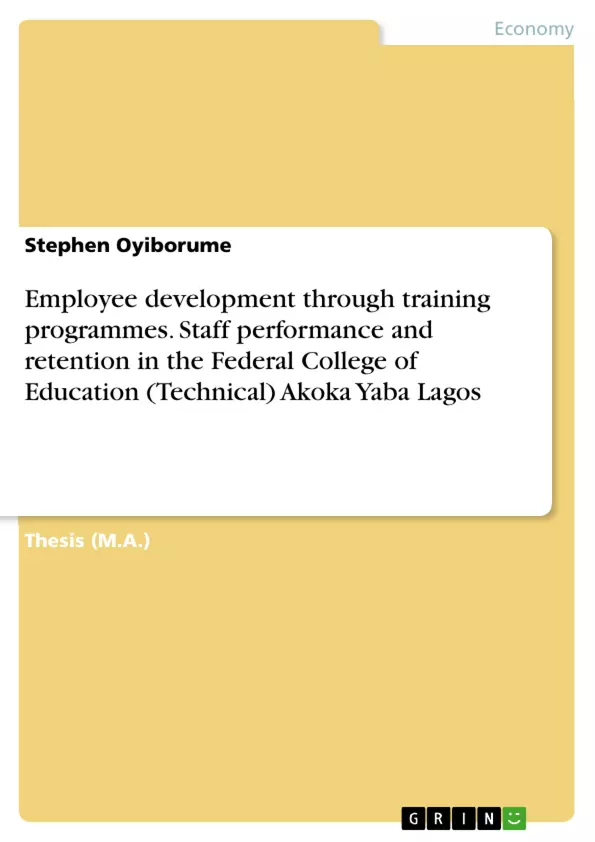The purpose of this study is to examine Manpower Training and Development, Staff Performance and Retention in Federal College of Education, Technical (FCET) Akoka Lagos State, Nigeria. The need for employee’s retention has encouraged the employers to pay attention towards Employee development through training in order to keep them motivated.
Training with development as a function of human resource management is concerned with organizational activity aimed at bettering the performance of individuals and groups in organizational settings. This study examine the manpower training and development and staff performance and retention and in Federal College of Education, Technical (F.C.E.T) Akoka Lagos. The study adopted a descriptive survey research design and the study population comprised all the academic staff of the Federal College of Education, Technical (FCET) Lagos State.
The sample size consisted of 150 respondents selected through the simple random sampling technique. The data collected were analyzed using descriptive statistics of frequency counts and percentages while inferential statistics of Chi-square (X2) was used to test all hypotheses at 0.05 level of significance. The findings of the study revealed that training and development of staff in an organization is very paramount.
Inhaltsverzeichnis (Table of Contents)
- Dedication
- Acknowledgements
- Abstract
Zielsetzung und Themenschwerpunkte (Objectives and Key Themes)
This study aims to investigate the relationship between manpower training and development, staff performance, and retention at the Federal College of Education, Technical (FCET) Akoka, Lagos State, Nigeria. The research explores how employee training programs impact staff skills, experience, and overall performance, ultimately influencing retention rates.
- Manpower training and development programs in FCET Akoka
- Impact of training on staff performance
- Correlation between training and staff retention
- The role of employee development in organizational success
- Recommendations for improving training programs to enhance staff performance and retention
Zusammenfassung der Kapitel (Chapter Summaries)
Abstract: This study examines the connection between manpower training and development, staff performance, and retention at FCET Akoka, Lagos. It uses a descriptive survey design with 150 randomly selected academic staff as respondents. The research questions and hypotheses explore the impact of training programs on staff skills, experience, and performance quality. The findings highlight the importance of staff training and its significant relationship with improved performance and retention. The study concludes that manpower training and development are vital for organizational success.
Schlüsselwörter (Keywords)
Manpower training and development, staff performance, staff retention, employee development, training programs, FCET Akoka, Nigeria, human resource management, organizational performance, descriptive survey, simple random sampling.
FAQ: A Comprehensive Language Preview
What is the purpose of this study?
This study investigates the relationship between manpower training and development, staff performance, and retention at the Federal College of Education, Technical (FCET) Akoka, Lagos State, Nigeria. It explores how employee training programs impact staff skills, experience, and overall performance, ultimately influencing retention rates.
What are the key themes explored in this study?
The key themes include manpower training and development programs in FCET Akoka, the impact of training on staff performance, the correlation between training and staff retention, the role of employee development in organizational success, and recommendations for improving training programs to enhance staff performance and retention.
What is the research methodology used in this study?
The study employs a descriptive survey design, with 150 randomly selected academic staff as respondents. The research questions and hypotheses explore the impact of training programs on staff skills, experience, and performance quality.
What are the key findings of this study?
The findings highlight the importance of staff training and its significant relationship with improved performance and retention. The study concludes that manpower training and development are vital for organizational success.
What are the key words associated with this study?
Key words include Manpower training and development, staff performance, staff retention, employee development, training programs, FCET Akoka, Nigeria, human resource management, organizational performance, descriptive survey, and simple random sampling.
What is included in this language preview?
This comprehensive language preview includes the title, table of contents, objectives and key themes, chapter summaries, and key words.
What is the table of contents of this study?
The table of contents includes a Dedication, Acknowledgements, and an Abstract.
- Quote paper
- Stephen Oyiborume (Author), 2019, Employee development through training programmes. Staff performance and retention in the Federal College of Education (Technical) Akoka Yaba Lagos, Munich, GRIN Verlag, https://www.grin.com/document/540723



